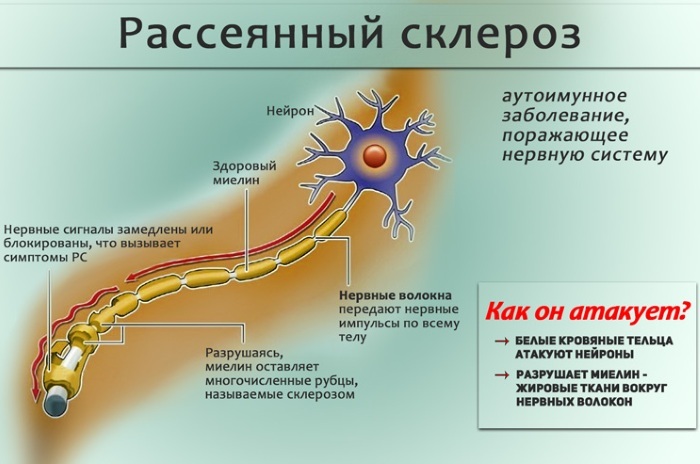Content
- What is enuresis
- Types and mechanisms of development
- Primary
- Secondary
- Causes of bedwetting in children and additional symptoms
- Delayed development of the urinary system
- Genetics
- Stress and trauma
- Wearing diapers
- Diseases of the genitourinary system, small bladder capacity
- Endocrine diseases
- Detrusor overactivity
- Antidiuretic hormone balance
- Nervous system pathology
- Sleep too deep
- Diagnostics and examination
- Medicinal treatment of bedwetting
- How to wean a child from peeing in bed
- Formation of motivation
- Training night awakenings for urination
- Sleep hygiene monitoring
- Improving the skill of self-control
- Regime and correct diet
- What parents shouldn't do
- What happens if infantile enuresis is not treated?
- Video about bedwetting
Problems controlling bladder emptying or a disorder called bedwetting in children can be a serious problem that needs treatment. Many children experience bedwetting (especially at a very young age).
Enuresis is characterized by urine leakage during sleep. This can happen only once or several times per night. It is important to understand what exactly causes such violations and try to correct them. Physiotherapy, medication, psychotherapy, or some change in the child's diet may be required.
What is enuresis
This is mainly incontinence during proper rest, which brings anxiety to both the children themselves and their parents. Most often, bedwetting goes away after a while, but sometimes the problem remains in his adult life. Mostly small children suffer from bedwetting, but the older they are, the less often this problem is diagnosed.
There are statistics confirming this:
| Child's age | How many children are diagnosed with nocturnal enuresis? |
| up to 4.5 | 1 child out of 12 |
| 4.5 to 7.5 | 1 child in 40 |
| from 7.5 to 9.5 | 1 child in 65 |
| After 9.5 | 1 child in 100 |
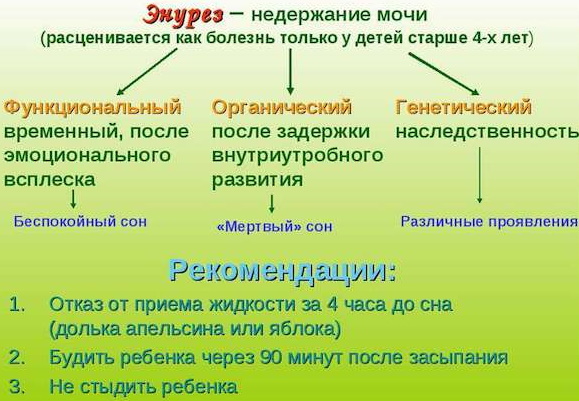 Also, according to studies, it was found that more enuresis occurs in boys than in girls. If you have serious concerns about urinating at night, it is recommended that you take your child to a urologist. This is a specialist who conducts diagnostic measures and prescribes treatment for pathologies of the urinary system.
Also, according to studies, it was found that more enuresis occurs in boys than in girls. If you have serious concerns about urinating at night, it is recommended that you take your child to a urologist. This is a specialist who conducts diagnostic measures and prescribes treatment for pathologies of the urinary system.
If bedwetting has occurred only a few times and does not recur at regular intervals, then there is absolutely nothing to worry about (especially if the child is not even 3-5 years old). It is worth contacting the clinic when enuresis really interferes with life, especially in the process of socialization of the child. For example, children who are left to spend the night with friends feel very uncomfortable and they are faced with a similar situation.
But if this happens exclusively in the apartment of friends, then in this case we are probably talking about a child's prank. It consists in the fact that the hand of a sleeping person is lowered into warm water. This can provoke urination.
Types and mechanisms of development
Nocturnal urinary incontinence in children, for which treatment may not be required, manifests itself in different ways. In pediatric urology, there is the concept of "incontinence" and "incontinence". In the first case, the person feels the urge to urinate, but is unable to control it.
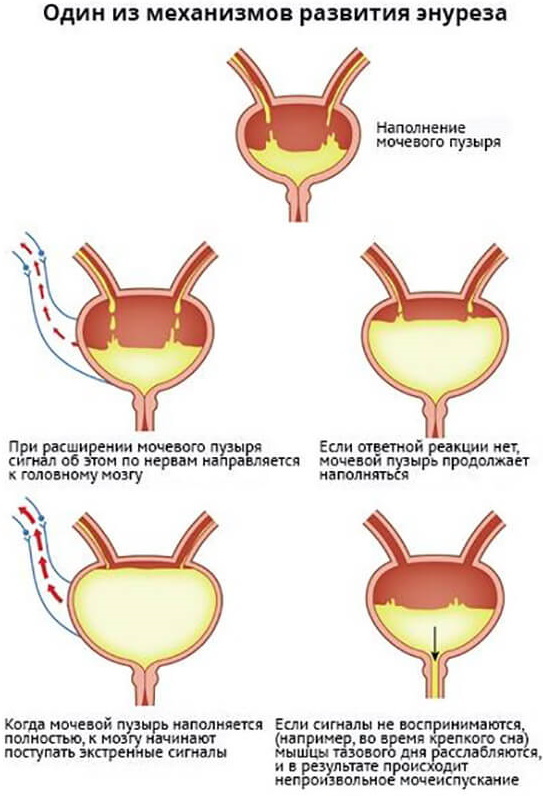
If we are talking about unrestraint, then the child does not at all understand what he wants to use the toilet, therefore he cannot control the bladder and realizes that he urinated only after a while. It is customary to call both of these conditions enuresis, but only if they are not caused by anatomical and physiological defects or mental abnormalities.
Urologists distinguish several types of development of this type of deviation:
- Imperative. This means that the child cannot independently control his urge to urinate. Such a problem is faced by children who have been diagnosed with a hyperreflex degree of a neurogenic bladder.
- Stressful. In this case, urinary incontinence is accompanied by efforts, which are accompanied by increased pressure inside the peritoneum. This means that urination occurs during coughing, laughing, sneezing, and more. This is due to the fact that the child's pelvic floor muscles are too weakly developed, and the functions of the urethral sphincter are weakened.
- Reflex. With this mechanism of development of enuresis, incontinence is triggered by the separation of the cortical, as well as the spinal centers, which are responsible for the regulation of the pelvic organs. In such a situation, urine only leaks in small portions or drops.
Also, incontinence can be primary or secondary.
Primary
Nocturnal enuresis (also called persistent) of this type appears from the moment of birth. After a while, the child realizes that he cannot control the reflexes of urination. First, he pees in the diaper, so the parents do not pay attention to this at all and cannot notice the presence of problems in any way. But when a child is taught to use underwear, the problem becomes apparent.
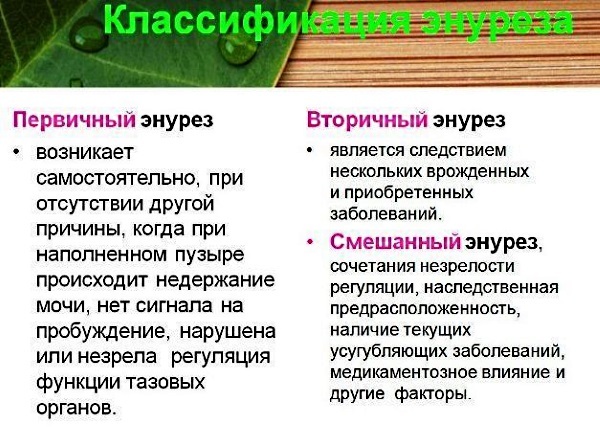
Also, this can occur against the background of nervous or mental disorders or disorders in the work of the urinary system.
Secondary
It is also commonly called recurrent. This refers to nighttime urination when the problem occurs about six months or more after the last similar episode. Very often, secondary enuresis is diagnosed during a state of stress, that is, for example, if a child has recently experienced a divorce or another child has appeared in the family. Also, similar problems occur simultaneously with a violation of the stool or if the child is diagnosed with pinworms.
Causes of bedwetting in children and additional symptoms
There are several factors worth considering that can cause a child to urinate.
Delayed development of the urinary system
Nocturnal urinary incontinence in children (treatment and its features are discussed later in the article) can occur if there is a violation of the functioning of the bladder itself. It is a special ball-like organ located in the pelvic area where fluid accumulates. When the bladder fills up, the fluid begins to move further and is excreted from the body in a standard manner.
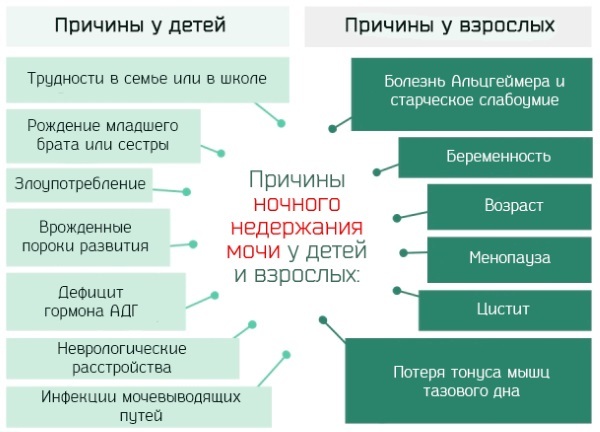
There is such a thing as overactive bladder. This means that the emptying of the bladder begins to be performed a little more often due to the fact that the muscle that controls this process is contracting more actively. This is what leads to uncontrolled urination.
Genetics
Doctors have long confirmed that nocturnal enuresis can actually be passed from parent to child. In this case, the problem can be diagnosed in identical and fraternal twins. Accordingly, if the father or mother had such problems in childhood, then with a probability of 50% the child will also suffer from it.
If both parents had enuresis, then this probability rises to 75%. In the event that the family has never had such problems, doctors always assume about 15% of the fact that the child will suffer from enuresis.
Stress and trauma
Urination at night is a sign that a child is in a difficult psycho-emotional state, worried about something, or very upset. Problems may arise in the case of transferring to another school or if he has just started first grade. Also, similar manifestations are observed in the case when a child has problems with someone and peers (for example, someone offends him).
There are many factors that can be upsetting for a child, but they will not show it or tell their parents about it. Therefore, it is worth taking a closer look at the child's behavior and trying to determine if something has recently happened in his life that could provoke enuresis.
Wearing diapers
Often, children who have only recently stopped wearing absorbent panties suffer from bedwetting. This is very easily explained by the fact that since his birth, the child has never thought about when and where he can go to the toilet, urination was performed directly into the diaper, which for the child is associated with the lower underwear.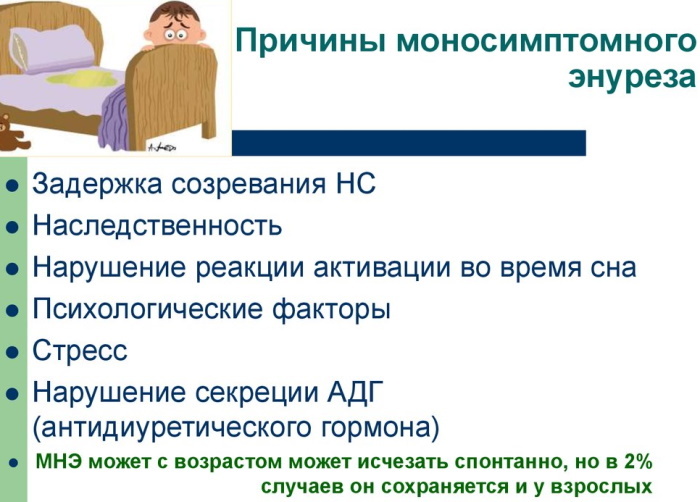
Therefore, it is difficult for him to understand how underwear differs from a diaper. The problem of such a plan is solved rather quickly. It is enough for parents to explain to the child how he should now go to the toilet and tell what a chamber pot is.
Diseases of the genitourinary system, small bladder capacity
Nocturnal urinary incontinence in children (treatment may be limited to a simple conversation with the child, but there are also more difficult situations) can begin due to the fact that the body is overly rapid production of urine. It is produced in the kidneys, which are responsible for cleaning the blood from metabolic products. Substances are diluted with water. As a result, a liquid is formed.
If the child drinks a lot of fluids throughout the day, then the kidneys begin to produce more urine. If he is used to drinking several glasses of milk, juice or water at night, then incontinence may occur at night.
The problem is exacerbated if the bladder capacity is small enough. Also, difficulties arise if you drink caffeinated drinks (for example, tea, Coca-Cola, and more) before going to bed. The fact is that caffeine is one of the diuretics. Based on this, we can say that the deviation is not due to the fact that the child suffers from any pathology or mental abnormality.
In some cases, enuresis develops due to the fact that there is not enough hormone in the child's body called vasopressin. This means that there is much more urine than can fit in the child's bladder.
Endocrine diseases
Problems can be observed with diabetes mellitus or diabetes insipidus, in the case of hypothyroidism or hyperthyroidism. Enuresis is one of the additional symptoms of these conditions. It is also believed that urinary incontinence can develop against the background of problems with the vascular regulation of the bladder. In some cases, this happens after taking drugs such as Thioridazine.
Detrusor overactivity
The point is that there is too active contraction of the muscles responsible for the expulsion of urine. Such a nuisance occurs more often during the day, but bedwetting can also occur, especially when a stable, that is, reflex, symptom occurs.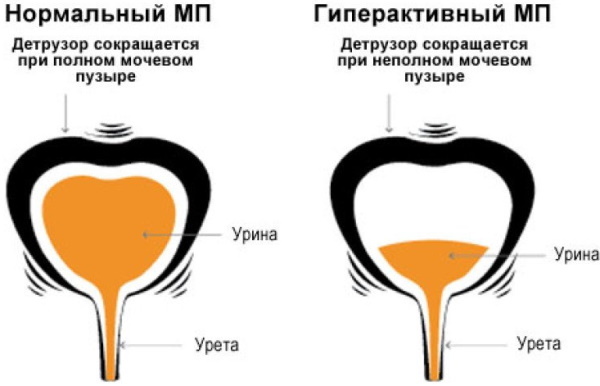
In the process of diagnosis, urologists most often find a violation of the circadian or circadian rhythm. Accordingly, the activity of the detrusor bladder is suppressed. Also, the problem may affect the work of the muscles of the peritoneum.
Antidiuretic hormone balance
This hormone is a substance that is directly involved in regulating the volume of urine produced by the kidneys. It is normal for the antidiuretic hormone to be more active at night. If during sleep it is not produced enough, then nocturnal polyuria develops. This is how doctors call the excess of urine volume at night.
Accordingly, this hormone is very important and any change in its amount may cause problems with urination. But this is not an explanation for the fact that the child does not notice the urge and does not wake up. Therefore, it is necessary to carry out additional diagnostic measures.
Nervous system pathology
In case of disturbances in the work of the autonomic system, there may be problems with the emotional state of the child. That is, on the one hand, the work of the bladder may be disrupted and sensitivity increases.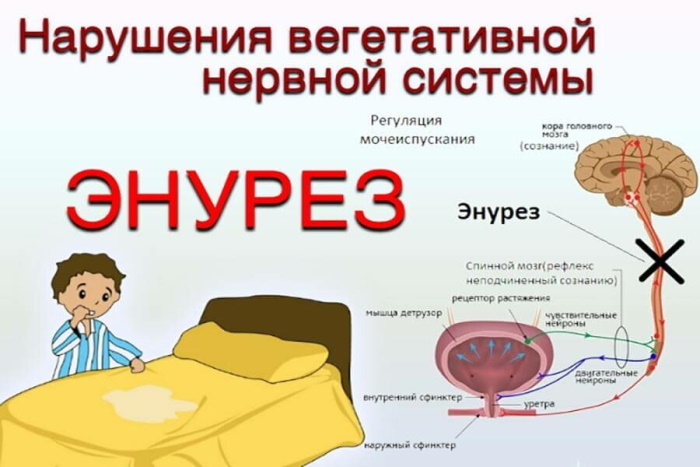 Accordingly, complex treatment will be required, part of which may be psychotherapy, drug treatment. This allows you to eliminate disorders of the emotional and neurotic type.
Accordingly, complex treatment will be required, part of which may be psychotherapy, drug treatment. This allows you to eliminate disorders of the emotional and neurotic type.
Sleep too deep
When fluid builds up in the bladder that stretches the bladder wall. In this case, the brain receives the appropriate signal and the person wakes up from this urge. But some children sleep very soundly. Accordingly, their brains simply do not respond to the signals they receive.
The problem may be (depending on age) that the child has not yet completed the full formation of the nerve endings of the bladder. Accordingly, the signals transmitted to the brain are not strong enough.
Some children wake up when this urge occurs, but do not consciously go to the toilet. This may be due to common fears. For example, a child may be afraid of the dark and do not want to walk down the hallway. In this case, it is enough to put a pot in his room or install bedside lamps that will slightly dispel the darkness.
Against the background of enuresis (regardless of its causes), emotional lability can develop, the child becomes more withdrawn and vulnerable. If the problem persists, then deviations in behavior and in the process of socialization may appear.
Diagnostics and examination
Bedwetting occurs predominantly in young children and may require treatment. If the symptoms of bedwetting are very intense and you have to change the sheet on the child's bed every morning, then you need to visit several doctors at once. First, you should make an appointment with a pediatrician, and then contact a urologist, nephrologist and, if necessary, a psychiatrist.
The study begins with the collection of anamnesis. The doctor asks the parents under what circumstances incontinence is observed, how often it manifests itself, whether there are concomitant symptoms. After that, the doctor examines the lower back, the perineal area.
Additionally, uronephrological examination may be prescribed. It allows you to assess the circadian rhythm and the intensity of urination. To understand what is causing enuresis, you need to perform a general urinalysis, culture and perform a number of additional tests. An ultrasound of the kidneys and genitourinary system can be performed. If, even after such a diagnosis, doctors do not have enough information, then a number of invasive procedures will need to be carried out. The doctor may prescribe cystometry, urethrocystoscopy and other measures.
Medicinal treatment of bedwetting
Any treatment for urinary incontinence can only be started after appropriate diagnosis. Otherwise, the child may be harmed even more.
When it comes to drug treatment, then doctors prescribe:
-
Desmopression-based drugs. For example, Minirin is highly effective. It is a synthetic analogue of antidiuretic hormone. Means of this type help to reduce the intensity of urine production. However, it should be borne in mind that drugs of this group are prohibited in some countries, since in rare cases their intake provoked serious complications. If it is nevertheless accepted to undergo a course of treatment with such a drug, it is very important to follow the dosage indicated by the doctor and not allow the child to drink any liquids right before bedtime.
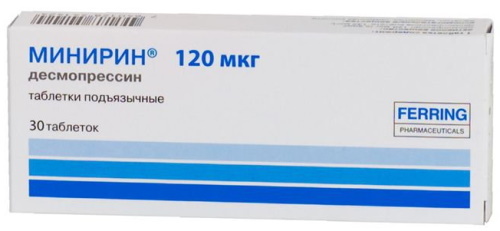
- Antidepressants of the tricyclic group. These include drugs such as Imipramine, Amitriptyline, and other similar drugs. They help reduce sleep. It also stimulates the production of antidiuretic hormone. In addition, the muscles of the bladder are relaxed, which makes it possible to slightly increase its volume. The dosage must be determined by the doctor. The course of treatment is usually 4 to 6 weeks. The side effects of such drugs are slightly less. There may be slight irritability. However, doctors also recommend taking these drugs with caution, as they may have little mental impact.
- Indomethacin. The drug is available in the form of suppositories. The doctor usually prescribes such a remedy if children over 6 years of age suffer from bedwetting or with the development of primary enuresis. The course of treatment is usually no more than 3 weeks. This drug has no known side effects. Indomethacin improves bladder function.
How to wean a child from peeing in bed
Nighttime urinary incontinence in children, the treatment of which is carried out in accordance with the recommendations of the doctor, gives the child many inconveniences. If incontinence is not provoked by pathologies and deviations, then you can help the child on your own.
Formation of motivation
If a child is wetting the bed, because he simply does not want to take on such responsibility, then it will be useful to start a notebook of his successes. That is, every time the child's bed remains dry, you need to praise him. Some parents even use a reward or reward system. For example, you can put a calendar on the refrigerator and stick a sticker on it on every successful day.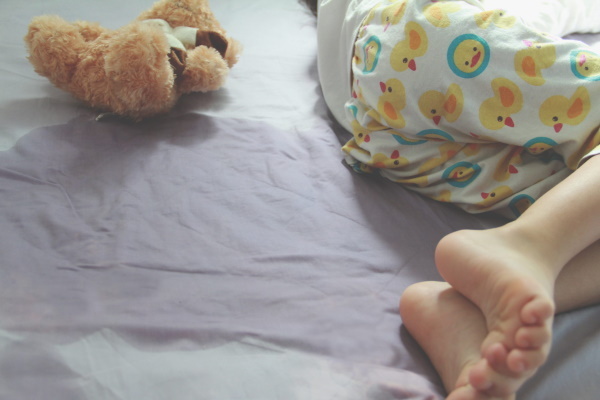
Studies have shown that motivational therapy is very effective and works 70% of the time.
Training night awakenings for urination
Such training is that the child must learn to retain urine. Such activities will slightly enlarge the bladder. Exercising can be unpleasant for your child, so you need to be patient and try to get them interested.
Training must be carried out so that at first the child learns to retain urine for a very short time. This time needs to be increased slightly every day. The child's progress should also be recorded in a diary. As soon as urinary problems disappear, you can stop exercising. It is also important that the child does not retain urine for too long.
Sleep hygiene monitoring
One of the ways to treat nocturnal enuresis is the so-called urinary signaling. The method consists in the fact that a special sensor is installed on the bed linen, which is triggered when it gets wet. An alarm clock, a pager, or a special vibrating belt that connects to the sensor can be used as a mechanism for the child.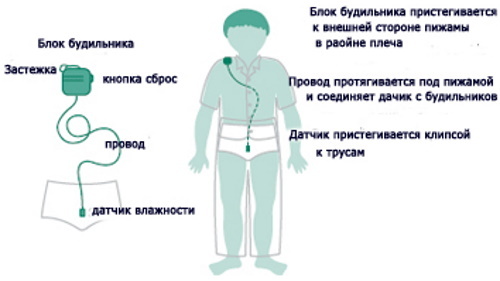
This allows you to develop a reflex in the child's mind to wake up when the urge to urinate appears. After a while, you can stop using such an alarm clock and see if there will still be problems with urination. If the child is sleeping too deeply and the sound or vibration is not able to wake him up, the parents should do it. You also need to explain to your son or daughter that you need to turn on the device yourself. This is an additional control exercise.
Improving the skill of self-control
You can develop self-control skills in the daytime. Perhaps the child is a little more spoiled or capricious and just deliberately does not go to the toilet at night. Therefore, you can offer him to take responsibility for any household chores. For example, at night, he must clean up toys on his own or perform some other minor duties.
Regime and correct diet
Nocturnal urinary incontinence in children (it is important to agree with a doctor) can be stopped if parents begin to control the amount of fluid that the child consumes throughout the day. In this case, there are many schemes.
For example, some experts advise drinking 40% of your daily fluid volume between 7 am and 12 am. After that, you need to drink the same amount from 13 to 17 hours. The remaining 20% is required to be consumed after this time. It is important that the drinks your child drinks at night are caffeine-free.
What parents shouldn't do
In no case should a child be scolded for enuresis. This can provoke serious psychological problems. It is necessary to understand that the child is most likely to do this unconsciously, and accordingly, such troubles are not his fault.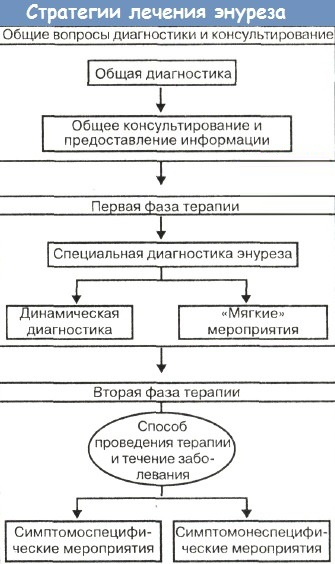
Also, you cannot completely prohibit drinking in the evening. This will help get rid of bedwetting, but it will create more serious problems. It is best to follow the pattern above, with the bulk of your drinking taking place in the morning and afternoon hours.
What happens if infantile enuresis is not treated?
In most cases, bedwetting resolves on its own and does not require treatment. But the doctor has to tell about it. Sometimes bedwetting does not go away for everyone. If problems persist after 6-9 years, then it can lead to mental disorders. For young children, incontinence is generally considered normal. But as the child continues to pee later, it will be more difficult for him to form good friendships. There is also a risk that incontinence will appear during the daytime.
The child begins to understand his "shameful" state at the age of 6-7 years. If at the age of 9-10 he goes to a children's camp, where children sleep in the same room, then his peers who do not have problems with incontinence may start laughing at him.
Enuresis can have a huge impact on socialization. Many children who go to kindergarten together then meet at school. It is very uncomfortable if they begin to tell such unpleasant details.
Until 5-6 years old, there is no point in scaring a child that he has a deviation. At this age, it is difficult for him to understand what is at stake.
In more rare cases, bedwetting can be a sign of more serious conditions in children. Accordingly, without the necessary treatment, the problem will begin to worsen. This can be a sign of diabetes mellitus, developmental abnormalities, and more. Therefore, it is important to carry out diagnostics in a timely manner.
Video about bedwetting
When and how to treat enuresis:



